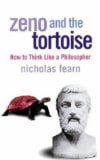 Zeno and the Tortoise: How to Think Like a Philosopher
Zeno and the Tortoise: How to Think Like a Philosopher
by Nicholas Fearn
Atlantic Books, £9.99, ISBN 1903809134
This is really a fun book. Fearn, a philosophy graduate of King’s College, tries to teach us some tricks of the philosophy trade. Each of twenty-five short chapters is identified with one well-known author and explains a basic thinking tool he (sorry, no she’s) invented or prominently used. The story begins with Thales of Miletus who introduces us to the principle of “reduction” of complicated issues to simpler questions. It ends with Jacques Derrida, whose “deconstruction” method finds contradictions inherent in most of our familiar and cherished ideas and beliefs.
The book is organized along a time-line covering some 2600 years of western thought, but it is not a history. Rather, it provides an introduction to the tools each philosopher used, together with a brief biographical sketch. Some of the ideas are widely known to educated persons. Socrates’ invention of “cross examination”, Plato’s reasoning by analogy between cave and reality, Aristotle and his teleology of immediate and ultimate purposes of things. Others are less eminent. Thomas Reid defended “common sense” – not something for which philosophers are famous. The concept of “emergent properties” is due to Gilbert Ryle. Not fame but innovative tools decide who made the cut. Popper and “falsification” made it, but Kuhn and Lakatos are missing. Neither Newton nor Leibniz are mentioned, but perhaps the calculus is not a philosophical idea. Even Bertrand Russell does not appear. Only Wittgenstein appears twice.
Many of the tools discussed are familiar, but their use is laid out plainly. We have heard of reductio ad absurdum, of Ockham’s razor, Bacon’s inductive reasoning, Decartes’ demon, and Rousseau’s social contract. Here these often loosely understood ideas are lined up, their meaning explained, their origin and use discussed, and each is set into a context of one philosopher’s thought.
All this, and in addition the book is well written, clear and straightforward.



